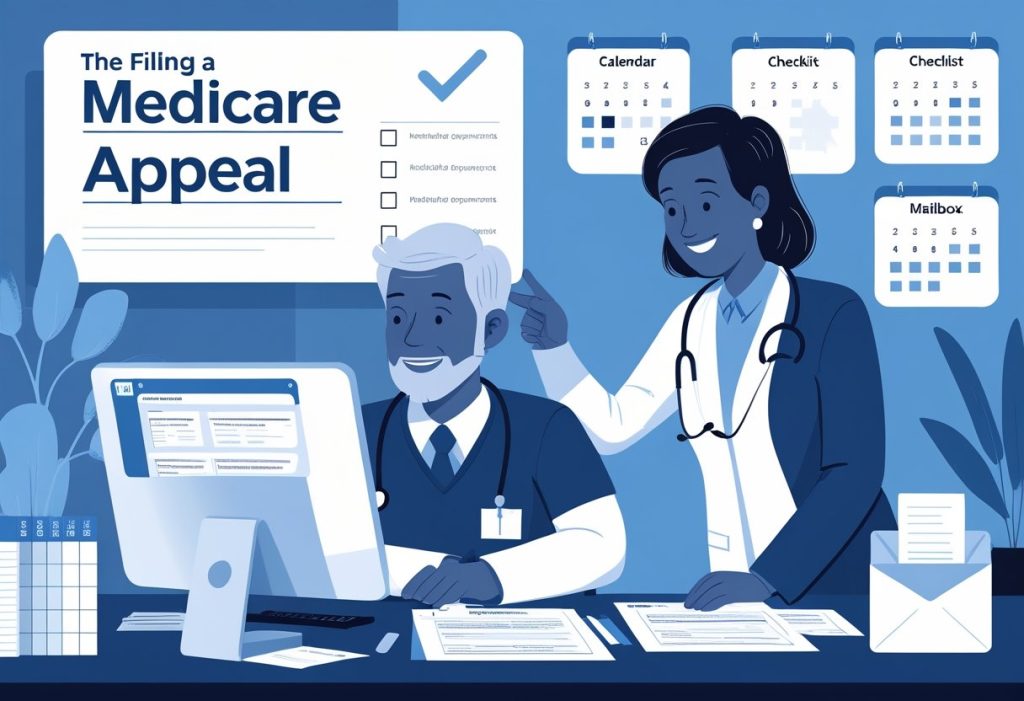Navigating the world of Medicare can be challenging, especially when you encounter a denial of coverage. Understanding how to file a Medicare appeal is crucial for you to ensure that you receive the healthcare services you need. You have the right to challenge any denial, and knowing the proper steps can help you advocate for your health effectively.
At The Modern Medicare Agency, we provide personalized support to help you understand your appeal rights and the Medicare process. Our licensed agents are real people who take the time to listen to your specific needs and guide you in filing a Medicare appeal without the burden of excessive fees. By working with us, you gain access to experts who can assist you every step of the way.
When facing a Medicare denial, being informed about your options is essential. This blog post will equip you with the knowledge needed to navigate the appeal process confidently and secure the coverage you deserve.
Understanding Medicare Appeals
Navigating the Medicare appeals process can be crucial for maintaining your healthcare coverage. This section breaks down what a Medicare appeal is, common reasons for denied claims, and your rights to appeal.
What Is a Medicare Appeal
A Medicare appeal is a formal request asking Medicare or your Medicare plan to review a decision about coverage. You might file an appeal if a service or item deemed medically necessary is denied. The appeal process allows you to provide additional information that supports your case.
It’s important to act quickly; you typically have 120 days from the date of the denial notice to file an appeal. Understanding the specific guidelines for submitting an appeal helps you respond effectively and increases the chance of a favorable outcome.
Common Reasons for Denied Claims
Claims are often denied for various reasons, and knowing these can enhance your appeal. Common reasons include:
- Lack of Medical Necessity: The claim may be denied if Medicare believes the service wasn’t medically necessary.
- Incorrect Information: Mistakes in patient information or coding can lead to denials.
- Coverage Limitations: Some services may not be covered by your plan or may exceed allowable limits.
Addressing these points in your appeal can help clarify misunderstandings and strengthen your case. You can often find specific denial reasons in the notice sent by Medicare.
Appeal Rights and Eligibility
You have specific rights when it comes to Medicare appeals. Under federal law, you can appeal any decision that denies coverage or payment for services. Eligibility requires that you be enrolled in Medicare, and the item or service must fall under its guidelines.
To exercise your appeal rights, follow the instructions in your denial notice. Ensure you include all relevant documents to support your claim. Consider working with The Modern Medicare Agency; our licensed agents provide one-on-one support tailored to your needs, without hidden fees. Together, you can determine the best approach for filing an appeal effectively.
How to File a Medicare Appeal Step-by-Step
Filing a Medicare appeal involves several crucial steps that ensure your case is handled correctly. Each phase requires attention to detail, from reviewing notices to gathering documentation. Below are detailed instructions to guide you through the process effectively.
Reviewing the Medicare Summary Notice and EOB
Start by obtaining your Medicare Summary Notice (MSN) or Explanation of Benefits (EOB). These documents outline the services provided, the amount billed, and what Medicare covered.
Check for any discrepancies in the amounts or services. Understand why your claim was denied, as this will help you form a solid basis for your appeal. Pay particular attention to the codes used and any notes made by your Medicare Administrative Contractor (MAC).
If the notice does not provide adequate information, consider reaching out to your MAC for clarification.
Gathering Documentation and Evidence
Collect all relevant documentation to support your appeal. This includes your MSN, any medical records, or treatment notes that justify your claim.
You will also need to compile any bills or invoices related to the denied service. Make sure you understand the redetermination request form procedure and fill out CMS-20027 if required.
If you have someone assisting you, like a family member or a professional, you will need to complete the Appointment of Representative (CMS-1696) form. This allows them to act on your behalf throughout the appeal process.
Completing Required Appeal Forms
Once you have your evidence in hand, proceed to fill out the necessary appeal forms. The redetermination request form is essential for filing your appeal with the MAC.
Be sure to provide detailed explanations about why you believe your claim should be reinstated. Attach all supporting documents, and ensure everything is signed and dated.
Double-check for any specific requirements outlined by Medicare for your type of appeal to avoid delays. Incomplete forms can lead to automatic denials, wasting valuable time and resources.
Tracking Deadlines and Submission Methods
Deadlines are critical in the appeals process. Generally, you have 120 days from the date on your MSN or EOB to file an appeal.
Mark your calendar and set reminders for important dates. Review the methods for submission—some appeals can be filed online, while others may require mailing physical documents.
Keep a record of everything you send and any communication with Medicare or your MAC. This will serve as crucial evidence if you encounter issues down the line. If you need personalized guidance, consider reaching out to The Modern Medicare Agency, where you can speak with licensed agents who can help you navigate the appeals process without incurring extra costs.
Navigating the Medicare Appeals Levels
Navigating the Medicare appeals process can seem overwhelming, but understanding the different levels can simplify your experience. Each level offers a specific avenue for challenging a denial, and knowing what to expect can help you effectively advocate for your rights.
Level 1: Redetermination by Medicare Administrative Contractor
The first step in the appeals process is Redetermination, handled by your Medicare Administrative Contractor (MAC). You typically have 120 days from the date of the denial to request a redetermination.
To proceed, you will need to submit a written request along with relevant documentation, such as claim numbers and a description of why you believe the decision should be reversed.
Once your request is submitted, the MAC has 60 days to review and inform you of their decision. Keep track of the timeline because if you disagree with the outcome, you can move to Level 2.
Level 2: Reconsideration by Qualified Independent Contractor
If Redetermination does not resolve the issue, you can request Reconsideration by a Qualified Independent Contractor (QIC). This request must be made within 180 days of receiving the Redetermination decision.
The QIC will conduct a more thorough review and has up to 60 days to issue a decision. Along with the request form, you should include any new evidence or information that supports your case.
The QIC may consider additional documentation and rationale. If you are not satisfied with the outcome, you can escalate to Level 3, which involves an Administrative Law Judge hearing.
Level 3: Administrative Law Judge Hearing
At Level 3, you can request a hearing before an Administrative Law Judge (ALJ). This option is available if your claim amount exceeds a set threshold, which is updated annually.
To initiate this process, submit a written request, including all relevant documentation and your reasoning for appeal. The OMHA (Office of Medicare Hearings and Appeals) manages these hearings, and they will schedule a date for your case.
During the ALJ hearing, you can present evidence and may have the option to appear in person or via teleconference. After the hearing, expect a decision within 90 days.
Further Appeals: Medicare Appeals Council and Federal District Court
If you disagree with the ALJ’s decision, there are additional options for appeal. You can request a review by the Medicare Appeals Council within 60 days of the ALJ’s decision.
Submitting a request to the Council requires documentation and specific forms, such as the CMS-20033. This Council will review the case, focusing on whether proper procedures were followed.
If you remain unsatisfied after this step, you can appeal to a Federal District Court. Note that this requires meeting a minimum claim amount and involves legal representation.
For personalized assistance navigating these steps, consider reaching out to The Modern Medicare Agency. Our licensed agents provide one-on-one support to find Medicare packages that fit your needs without hidden fees.
Appeals by Plan Type: Original Medicare, Medicare Advantage, and Drug Plans
Understanding the appeals process is crucial when navigating Medicare. Each plan type—Original Medicare, Medicare Advantage, and Medicare Prescription Drug Plans—has its own procedures for filing appeals. Below, you’ll find detailed steps to take for each type, ensuring you’re informed and prepared.
Original Medicare (Part A & B) Appeals Process
If you receive a denial from Original Medicare, you have the right to appeal. The process begins with a written notification of the denial, which will include the reason for the decision.
You can file an appeal by submitting a request for reconsideration to the Medicare Administrative Contractor (MAC) responsible for your claim. This must be done within 120 days of the date on the denial notice.
To increase your chances of success, include relevant documents, medical records, and a detailed explanation that supports your case. Follow up with the MAC to ensure your appeal is received and being processed.
Medicare Advantage Plan Appeals
For Medicare Advantage plans, the appeals process resembles that of Original Medicare but has distinct steps. If your plan denies coverage for a service, you will first receive a notice explaining the reason for the denial.
You should contact your Medicare Advantage plan directly to initiate the appeal. The timeline for filing is generally within 60 days of receiving the notice.
Your appeal will go through several levels, which might require additional documentation or even a hearing. Keep records of all communications with the plan, as this can be crucial for resolving disputes effectively.
Medicare Prescription Drug Plan (Part D) Appeals
When it comes to Medicare Prescription Drug Plans (Part D), you can also appeal if your request for coverage is denied. Start by reviewing the notice provided by your plan, which typically outlines the reasons for the denial.
You can file your appeal through the plan’s customer service or website, often within 60 days from the denial notice. Ensure you provide evidence or prescriptions to support your claim.
After your initial appeal, if denied again, you have the option for a second level of appeal, known as a “redetermination,” which is handled by the plan itself.
Understanding Fast Appeals
In some cases, particularly when a delay in coverage could harm your health, you can request a fast appeal. This expedites the process, allowing for a resolution within 72 hours.
To qualify for a fast appeal, you must explain why waiting could have serious health implications.
The Modern Medicare Agency can help you navigate these needs. We offer personalized support through licensed agents who guide you, ensuring you align with the right Medicare package without breaking the bank. You deserve clarity and support while handling your Medicare appeals.
Support and Representation During the Appeals Process
Navigating the Medicare appeals process can be overwhelming. Seeking support and representation is crucial to effectively challenge decisions. Here are some valuable resources you can utilize.
Getting Help from the State Health Insurance Assistance Program
The State Health Insurance Assistance Program (SHIP) offers free, personalized assistance to Medicare beneficiaries. They can help you understand your rights and navigate the appeals process, including how to file an appeal. SHIP counselors are knowledgeable about Medicare policies and can guide you through completing necessary forms, such as the CMS-1696, to appoint a representative if needed.
To find your local SHIP, visit the official SHIP website or call their national hotline. This resource can help demystify the appeals process and ensure you understand each step of your appeal.
Appointing a Representative to Assist with Your Appeal
You have the right to appoint someone to act on your behalf during the Medicare appeal process. This could be a family member, friend, or a professional advocate. By completing the CMS-1696 form (Appointment of Representative), you grant that person authority to receive information and communicate with Medicare regarding your case.
Make sure the representative you choose is well-versed in Medicare guidelines to ensure they can navigate complex processes effectively. Using this option can give you peace of mind and allow you to focus on other aspects of your healthcare.
Working with Healthcare Providers and Advocates
Collaboration with your healthcare provider can significantly enhance your appeal efforts. They can provide documentation and testimony that supports your case, highlighting the necessity of the services denied by Medicare.
Consider reaching out to local advocates or organizations specializing in Medicare issues. They often have experience with appeals and can offer guidance tailored to your situation. When you partner with knowledgeable advocates and providers, you bolster your chances of a successful appeal.
For personalized assistance tailored to your Medicare needs, The Modern Medicare Agency is here to help. Our licensed agents provide one-on-one support, ensuring you find the right Medicare plans without unnecessary fees.
Frequently Asked Questions
Filing a Medicare appeal can be a complex process with specific steps and considerations. Below are some frequently asked questions that can help clarify the procedure and ensure that you are well-equipped to navigate your appeal.
What steps are involved in appealing a Medicare decision?
The appeal process typically involves several steps. First, you must review the denial letter to understand the reason for the decision. Next, collect any necessary documents, such as medical records, to support your case. Finally, submit a written appeal to the appropriate Medicare Administrative Contractor (MAC).
Where can I find the appropriate forms for filing a Medicare appeal?
You can find the necessary forms for filing a Medicare appeal on the official Medicare website. Specifically, the “Medicare Redetermination Request Form” is commonly used for appeals. Ensure that you fill out the form completely and provide all required documentation.
As a healthcare provider, how can I appeal a Medicare reimbursement decision?
As a healthcare provider, you can appeal a Medicare reimbursement decision by submitting a written appeal to the MAC that processed the claim. Include details about the service provided, the reason for the appeal, and any supporting documents. Make sure to adhere to the deadlines specified in the denial notice.
What is the process for appealing a Medicare decision regarding skilled nursing facility coverage?
To appeal a decision regarding skilled nursing facility coverage, you should first review the notice you received. Then, gather relevant documentation regarding your care and submit an appeal using the appropriate form. Medicare typically has five levels of appeal for this type of decision.
How can I file a complaint with Medicare online?
You can file a complaint with Medicare online through the Medicare Complaint Form available on their website. Fill out the form with details about your experience and any issues you’ve encountered. Make sure to provide accurate information to facilitate the review process.
What is the contact information for the Medicare appeals department?
To contact the Medicare appeals department, you can call 1-800-MEDICARE (1-800-633-4227) for assistance. Additionally, you can visit the Medicare website for more specific contact details related to your region or for particular inquiries.
When navigating the Medicare appeals process, working with experts from The Modern Medicare Agency ensures you receive personalized support tailored to your specific needs. Our licensed agents are available for one-on-one consultations to help you identify Medicare options without incurring extra costs.






